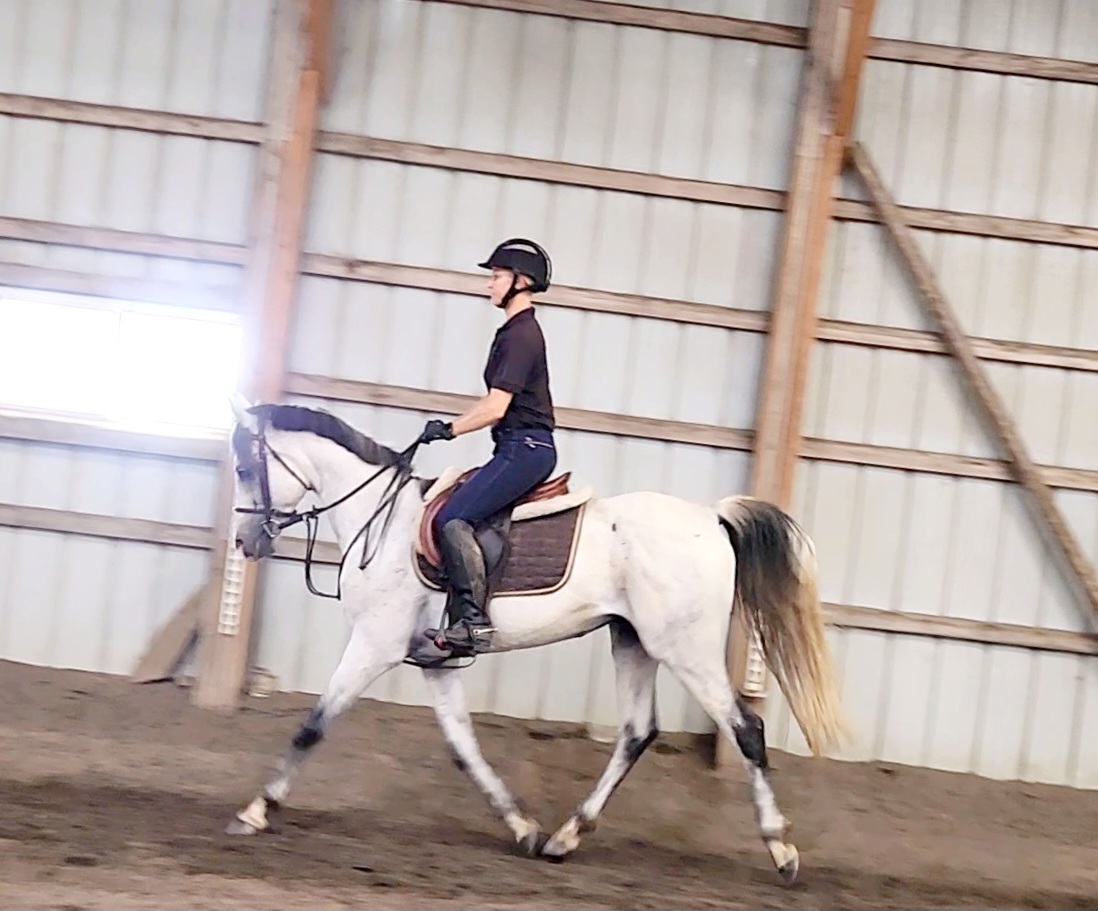Dr. Joe Pagan, an Arkansas native, has built an incredible research facility from a small farm in Versailles in 1988, that now stretches over 144 rolling bluegrass acres, not to mention a global presence, a partnership with some 40 feed companies on six continents, and has been involved with supplying the horses with feed at the Olympics since Atlanta in 1996. KER employs about 35 staff, roughly 20 of whom are based out of the Versailles base. They take internships, both multi-year, and summer-length who live on the farm. Also included on the staff is a double board certified veterinarian with a masters degree in nutrition.
After graduate school in New York, Dr. Pagan ended up working for a big American feed company in Tampa and Pennsylvania, and then had the opportunity to come to Kentucky to work for a smaller feed company here in Kentucky.
“While working for both of those, I came to the realisation that there’s this giant disconnect between what’s going on in the real world of feed manufacturing and feeding horses, and what was going on at the University. The University does a lot of research, publishes a lot of papers, but they’re not hugely concerned with that information ever actually making it out onto the street. That’s not what they get paid or promoted for. They’re rewarded for good science, but the applicability of that science is not always there. I’ve always liked research, and that end of academia, but having worked in the feed industry, I decided to create a business where we bridge the gap between the two, and have the best of both worlds.”
During last year’s World Equestrian Games, KER hosted the US para-dressage team for their training prior to the competition, and also the Australian Endurance Team. KER also supplied the feed,
“Due to all our previous experience with the Olympic Games, it was a natural for us to be involved, and the lady who was the Stable Manager in Atlanta became the competition manager at WEG, so there was some sort of continuity there. For us, having done all the Olympics, we knew all the Federations, we knew what expectations were, and it was right here on our doorstep so it was a lot easier to do WEG. In the Olympics you have to predict what people are going to want a long way out, and you have to ship everything over there in shipping containers to get there before they lock down the venue. It’s very difficult because the teams haven’t even named horses yet – we’re sending stuff and they haven’t even announced the teams, we don’t even know for sure if some of the teams will be going, so financially it’s very risky because you could end up with a bunch of stuff that you didn’t need, or worse, run out of stuff that you need, and it’s not like going round the corner to your local store. Here for the WEG, we could get things done in no time at all. We could bring stuff in if we didn’t have it, we even set up a little feed mill in the back so that we could make little boutique batches of mixes as needed.”
The feed mill has come in handy since the WEG, for reseach purposes for exactly the same reasons; in experiments where only a small batch of a particular feed mix is needed, the right amount can be made to exact specifications, sparing the waste and expense of having to order a couple of tons from a larger producer.
You may have seen KER featured on Discovery Channel’s Dirty Jobs, but Dr. Pagan kept a low profile, appearing only very briefly, and you may like me, by now be getting a little confused as to exactly what KER does. Dr. Pagan explained,
“We’re probably foremost consultants, to the feed industry; helping them create new types of products and technically support their products, and how we classify that relationship is as a brand alliance. The majority of the feeds that these manufacturers make are their feed, but on that bag of feed it says, “In Conjunction with Kentucky Equine Research, or something along those lines. It’s similar to if you look at a computer and it has “intel inside” on it – we’re the intel that goes inside their feeds.
There are important things that won’t go inside a bag of feed though; nutrients that are too expensive for instance, there are shelf life issues, there’s specificity where one horse at the barn might need it but not another, so for that we develop our own line of products. If we can’t integrate it into the horse feed, we’ll develop them and market them under our own brand, called KERx, which is special needs nutrition.
Then our research falls into three different categories; one is collaborative research, we collaborate with vet schools, universities, other private companies to do research, and we’ve done a lot of nice work with the University of Minnesota, whereby we developed a feed for horses that tie up and now a portion of the royalties from that feed (Releeve) go back to research into azoturia at the University. We also do field research – probably the biggest example of that is in measuring growth and development. We’ve developed software so that we can crunch the numbers and use all the data that the feed companies have been collecting and make it usable. Finally, the research we do here at this facility is controlled research that we do on a relatively small number of animals but under extremely controlled circumstances. Some of the work we do, just because it’s an interesting question, but there’s really no commercial application, about a third of what we do is questions that we hope can be implemented by the feed manufacturers we work with, and the rest of the work is to develop products that complement feed that don’t fit specifically into one of those categories.”
The 30-odd horses that are used for the research are all owned by KER, and all happen to be thoroughbreds. Some were bred on the farm, some were bought by Dr. Pagan as yearlings or two year olds. Typically, he would try and find a job for them after their research career was over – his wife is eventing several alumni, and there are some twenty-something year olds that were born on the farm living out their lives there, but now he’s doing it the other way round, and is racing them first, and then retiring them to research. Dr. Pagan proudly showed me his first win photo, Just Like Harry,
“I’ve had a lot of fun with these racehorses, it changes your perspective entirely when you’re actually in the game as opposed to just on the sidelines. Usually when we deal with racehorses from a consulting standpoint it’s with Sheik Mohammed’s horses or horses that are at the top end of the game, so owning these cheap horses and figuring out where to run them, how far and where they can be competitive is really fun. Not a way to make money, for sure. My goal for these guys is to get them to pay for themselves.”
Dr. Pagan’s daughter used to ride,
“When she was really young she was horse crazy – every drawing she would do was of horses, every book she read was horses, she had a pony that she loved and rode. Then one day she read her first Harry Potter book, and she completely lost interest in horses! 100%! My son never had any interest in horses to begin with so they’ve gone off in their different directions which in a way I think is good. That I happened to choose horses as a vocation shouldn’t influence them, and I’m the only one in my family that has anything to do with horses too. I do think it’s cool to see the father/son dynasties like Bruce and Buck, but on the other hand I like the idea that the kids could search out on their own what their interests are. “
KER has an active social media presence and Dr. Pagan was quick to realise the importance of digital outreach. (“KER” was registered as their URL way back in 1995 – “at the time it just made so much sense” ). You can follow KER on twitter at @kyequine, join their facebook page, sign up for a digital newsletter, check out their website, or their news site, Equinews, frequently updated library of articles written by on site staff.
“One of the things that we say we bring to this marriage between us and the feed manufacturers is technology, which would be our nutrition research; but also credibility, and profile – we’ve got to get the word out”
KER is the official equine nutritionist of the USEF, and does the same for the Australian Federation, as well as sponsoring the Australian Endurance team. They also sponsor individual riders Phillip Dutton and Karen O’Connor amongst other eventers and across the disciplines.
Dr. Pagan spends an awful lot of his time traveling; for instance he told me in late June he’s going to England for a couple of weeks, then on to Australia via Oman and Singapore, returning to Kentucky some five weeks later. He estimates that probably every other one of his international trips ends up being a round-the-world journey,
“Going around the world is easier because you make little steps at a time, there may be a three hour time change, instead of a twelve hour one, once you get over the Pacific. The biggest challenge is the change of climate, like I did one last January, where I started in Australia, went through Singapore and Dubai, and I ended in Copenhagen; trying to carry the correct clothes to go through the southern hemisphere, into the Middle East and then to the northern hemisphere..”
Although the traveling has become something of a downside for Dr. Pagan, he still loves his work, and I asked him what he gets excited about after all this time?
“Finding something new. Typically when you do an experiment you have a hypothesis – you think you know the answer before you start, and you do the experiment to see if you’re right. It’s really cool when you find something unexpected, that might lead you down another path, and you actually either debunk some dogma in the industry or you find a new discovery.”
Dr. Pagan has accomplished so much, and I wondered what keeps him going, why he continues to travel and work so hard, if there’s something he feels he has yet to attain?
“I feel I’ve been very fortunate to do just about everything I’ve wanted to do. I guess like everyone, I really would like to leave a mark on this earth before we leave! I mean, we’ve made a nice contribution, but doing something that’s really meaningful is something that would be interesting to do. I’m very excited about the prospects of this digital outreach, the idea that you’re able to potentially communicate a message to so many people all over the place instantaneously, to me that’s the best thing that could possibly happen.”
I’d like to thank Dr. Pagan for his time, and thank you reading. Go and feed your horse, and Go Eventing!


























